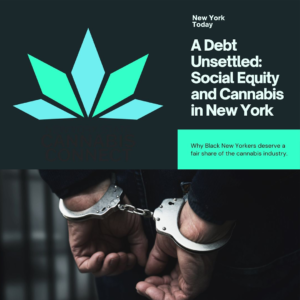
Since March 31, 2021, the public has been quite vocal about their opinions regarding the legalization of cannabis in New York.
From its medical benefits to its economic advantages, cannabis has been proven to be highly beneficial to both individuals and communities in a variety of ways, and this widespread appeal has garnered many supporters in favor of legalization.
One supporter in particular stands out from the rest.
Kaitlyn Parr, a University of Rochester student, has repeatedly vocalized her support despite her decision to not use cannabis herself.
Parr had previously smoked cannabis on occasion, but after the negative effects began to outweigh the positives for her, she decided it would be more beneficial to stop altogether.
“I have absolutely no desire to smoke marijuana,” Parr said. “To be quite honest, it’s not the best for individuals, at least for me, with mental illnesses and disorders. Most of the time you have to be in the correct headspace, and the majority of the time I am not.”
Regardless of how cannabis has affected her in the past, it hasn’t influenced her support of legalization.
“People have been using it for a very long time regardless of the fact of if it was legal or not. Weed can not only help with specific mental disorders such as anxiety, but it can also help in a sense for people who battle chronic illnesses and chronic pain,” Parr said.
Parr understands those who are opposed to cannabis use, based on her own negative personal experience, but she still stands strong in her support of its legalization in New York.
Parr believes some may be against legalization because they went through a negative experience with cannabis as she did.
“[For] individuals who may have potentially smoked marijuana in the past but it’s tied to unfortunate events, it can be seen as a trigger. The smell, scent, or even growing up in a household that was surrounded with that smell could trigger things,” Parr said.
For these individuals, marijuana can cause more harm than good, regardless of the potential positive effects.
Another reason why Parr believes people oppose legalization is due to a lack of education surrounding the substance.
“A lot of people view [marijuana] as a gateway drug and I think they, in the most kind way, don’t fully understand that it is a useful tool for individuals to get off of more harmful drugs or alcohol. Most of the time, the data usually shows that weed helps more people than it harms,” Parr said.
A gateway drug is a drug whose use can lead to potential abuse of or dependence on another drug, typically one that’s more harmful. Alcohol is one such example of a gateway drug.
While it has been hotly debated whether or not cannabis falls under this category, cannabis has, in fact, been proven to help drug abusers or addicts to stop using harder drugs.
“I have a close friend, and she used to be an alcoholic,” Parr said. “She got to the point where she had to go to prison because she was involved in a drinking and driving incident and ended up hitting two pedestrians. Luckily those two individuals are alive, but they sustained some injuries.”
Parr’s friend had been using other types of hard drugs at the time in addition to drinking very heavily. Cannabis helped her with her addiction and she is now fully recovered today, although she remains a heavy cannabis user.
While addictions can be transferred to other substances like cannabis, it is undoubtedly a safer alternative than hard drugs like cocaine, heroin, or amphetamines.
Parr herself supports legalization in part due to its medical benefits after witnessing how it has helped her friends throughout her life.
“I lost someone to cancer that I was extremely close to, and towards the end of her life, she had to use weed to even eat food and reduce pain,” Parr said.
Parr’s friend was diagnosed with stage five cancer, suffering from the side effects of chemotherapy as well as the cancer itself.
“It was all over her body,” Parr said. “At a certain point, the pain was too unbearable; she couldn’t even put food down without having to throw up. That’s why I support cannabis legalization. I have a personal connection with it. It’s a very helpful tool to give better quality of life for individuals who are terminally ill, such as her.”
Parr’s personal connection to cannabis grew after seeing it alleviate her friend’s symptoms firsthand, and this solidified her support of legalization. Without it, her friend would have been suffering far greater in a state of constant agony.
While cannabis can help alleviate symptoms associated with physical conditions, it can also help with mental health problems as well.
Parr’s boyfriend suffers from anxiety and insomnia, making it very difficult for him to navigate social interactions as well as get adequate sleep.
“People who suffer from anxiety like my boyfriend, they use it for anxiety and sleep. Pretty much the only way that he can sleep is by smoking,” Parr said.
Sleeping is crucial to one’s mental and physical health, as interrupted sleep or an insufficient amount of sleep can negatively affect a person’s well-being.
Lack of sleep can also aggravate symptoms associated with anxiety disorders, making it even more difficult to function in everyday life.
Parr’s boyfriend uses cannabis to help him fall asleep faster while also ensuring a better quality of sleep. With cannabis use, it can be easier to fall asleep and stay asleep. This allows him to enjoy a higher quality of sleep, alleviating any negative effects his insomnia may otherwise have on his mental or physical health.
With proper sleep thanks to his cannabis use, Parr’s boyfriend experiences less anxiety, making it far easier to interact with others socially without added stress.
While Parr has witnessed cannabis help many people in her life, the main reason why she supports legalization is her belief that other people have the right to do what they want with their body.
“I mean, at the end of the day, I don’t have a right to dictate what other people do with their body. That’s why I really don’t care if people smoke weed. I don’t have a right to dictate other people,” Parr said.
New York State Cannabis Connect







